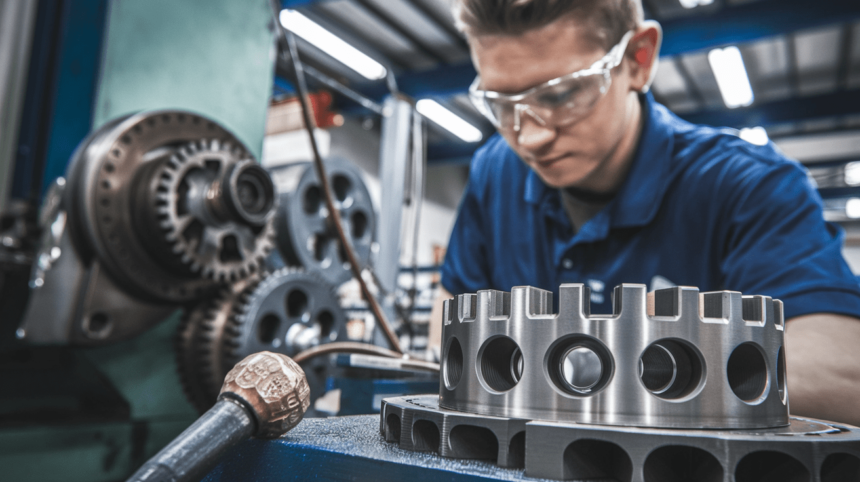Metal fabrication plays a crucial role in the field of mechanical engineering, providing essential support for various projects and applications. For mechanical engineers, the ability to understand and utilize metal fabrication processes is fundamental to creating innovative mechanical engineering solutions. In 2024, as industries continue to evolve, the significance of metal fabrication remains paramount, affecting the design, production, and functionality of mechanical systems.
What is Metal Fabrication?
Metal fabrication encompasses a range of processes that involve the manipulation of metal materials to create structures and components. These processes include cutting, welding, machining, and assembling metal parts to produce finished products. From intricate machine parts to large structural components, metal fabrication serves as the backbone of various mechanical engineering projects. The diverse applications of metal fabrication are evident in sectors such as automotive, aerospace, construction, and manufacturing.
The Role of Metal Fabrication in Mechanical Engineering
Mechanical engineers rely on metal fabrication for numerous reasons. One key aspect is the ability to produce tailored solutions that meet specific project requirements. By leveraging metal fabrication techniques, engineers can create customized components that fit precise dimensions and specifications. This capability allows for more efficient designs, ultimately leading to better-performing systems.
Additionally, metal fabrication provides mechanical engineers with the tools needed to optimize functionality and performance. Engineers can design components that are lightweight yet durable, which is especially important in industries such as aerospace where reducing weight can lead to significant fuel savings. Advanced fabrication techniques allow engineers to explore various materials and alloys, further enhancing the performance characteristics of their designs.
Metal Fabrication Trends in 2024
As the industry progresses, staying updated on metal fabrication trends becomes essential for mechanical engineers. In 2024, several key trends are shaping the landscape of metal fabrication:
- Automation and Robotics: The integration of automated systems and robotics in metal fabrication processes is becoming increasingly common. These technologies improve precision, reduce labor costs, and enhance production efficiency, enabling engineers to focus on more complex tasks.
- Additive Manufacturing: Also known as 3D printing, additive manufacturing is revolutionizing metal fabrication. Mechanical engineers can create complex geometries that were previously difficult or impossible to achieve through traditional methods. This trend allows for rapid prototyping and production of customized parts.
- Sustainable Practices: With a growing emphasis on sustainability, many metal fabrication companies are adopting eco-friendly practices. This includes using recycled materials, reducing waste, and implementing energy-efficient processes. Mechanical engineers are increasingly tasked with designing products that minimize environmental impact.
- Advanced Materials: The development of new metal alloys and composites is expanding the possibilities within metal fabrication. Mechanical engineers are exploring innovative materials that offer improved strength, corrosion resistance, and thermal properties, enhancing the overall performance of their designs.
The Importance of Collaboration
Collaboration between mechanical engineers and metal fabrication experts is vital for successful project execution. Engineers must communicate their design requirements effectively, ensuring that fabricators understand the intended functionality and performance specifications. This collaboration can lead to more efficient production processes and better quality control.
Moreover, mechanical engineers can benefit from the expertise of metal fabrication professionals when it comes to selecting appropriate materials and fabrication techniques. By working together, both parties can identify potential challenges early in the design phase, leading to innovative solutions that streamline the fabrication process.
Challenges in Metal Fabrication
While metal fabrication is essential for mechanical engineering, it does come with its own set of challenges. Engineers must navigate issues such as material availability, cost constraints, and quality assurance. Moreover, the rapid pace of technological advancements means that engineers must continually update their skills and knowledge to keep pace with evolving fabrication techniques.
One significant challenge is ensuring quality throughout the fabrication process. Mechanical engineers must implement rigorous testing and inspection protocols to verify that fabricated components meet the required standards. This includes evaluating material properties, dimensional accuracy, and overall performance.
Future Prospects
The future of metal fabrication in mechanical engineering appears promising. As new technologies and materials continue to emerge, engineers will have access to a wider range of tools and techniques to enhance their designs. The growing trend towards automation and digitalization will likely lead to more efficient production processes and improved collaboration between engineers and fabricators.
In addition, the demand for sustainable practices in manufacturing will push engineers to innovate further. As companies seek to reduce their carbon footprint, mechanical engineers will play a crucial role in developing solutions that align with environmental goals.
In conclusion, metal fabrication is an integral component of mechanical engineering, providing the necessary support for creating effective and innovative solutions. Understanding the various processes involved in metal fabrication is essential for mechanical engineers to design components that meet specific requirements and perform efficiently. By staying informed about the latest metal fabrication trends and fostering collaboration with fabrication experts, engineers can ensure their projects are successful. As the industry evolves, partnering with a reputable metal fabrication company will be crucial for mechanical engineers looking to remain competitive in an ever-changing landscape.







